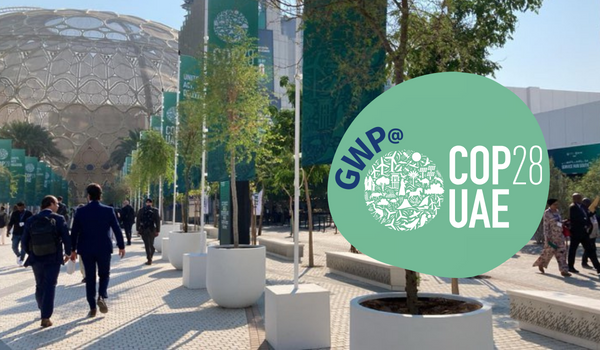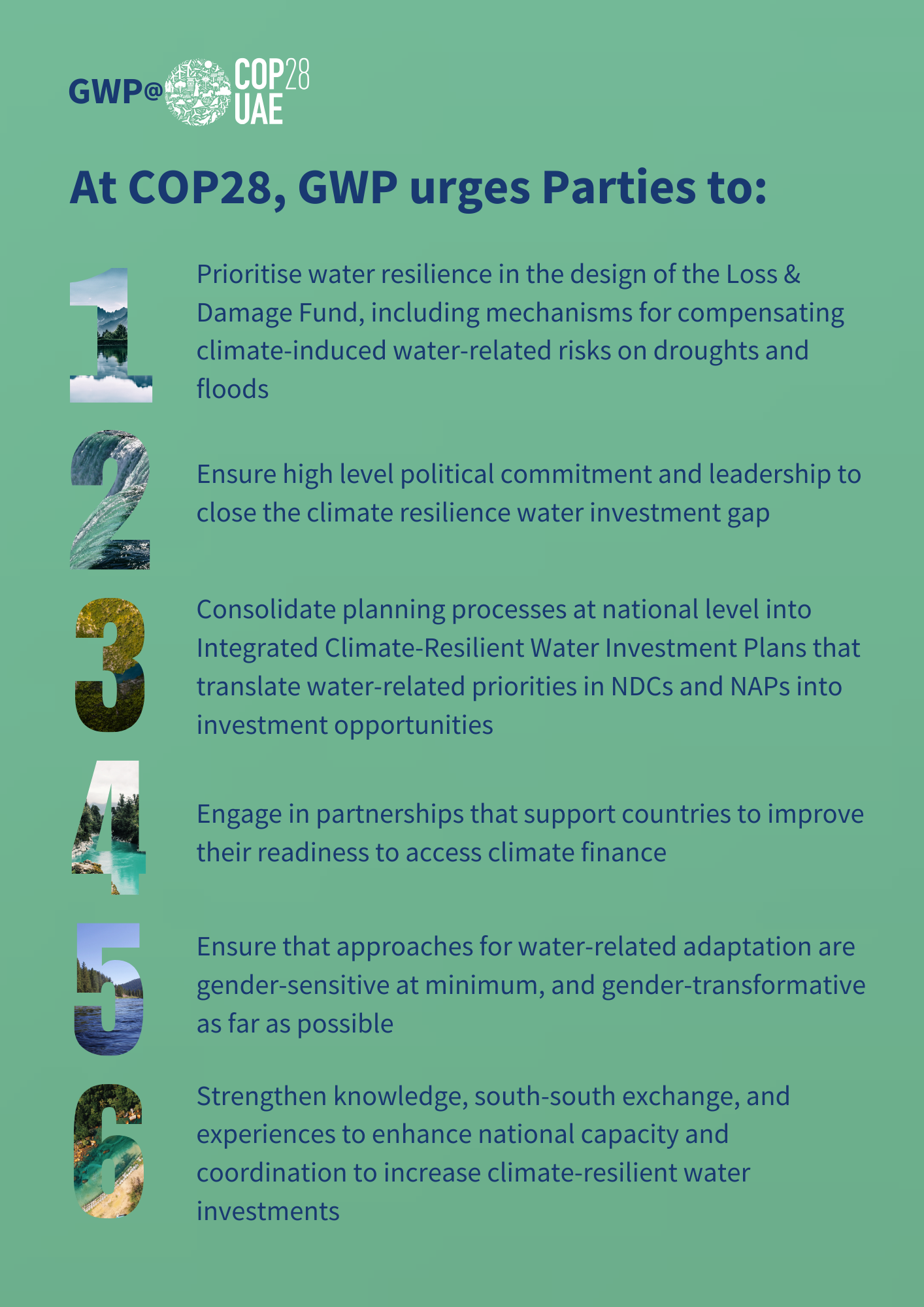The essential inclusion of a water target in the Global Goal on Adaptation | Driving climate change strategy implementation through climate finance | Collaborative processes strengthen water resilience | Ensuring countries have the support they need to access climate finance | Looking ahead
Over the two weeks of COP28, GWP was involved in more than 20 sessions, co-curated a thematic day in the Water for Climate Pavilion, and pursued a range of bilateral exchanges. Our work continued to keep water action at the forefront of climate resilience efforts to build a more just, inclusive, and resilient future for all. We had the following six messages to world leaders:
Alex Simalabwi, GWP Southern Africa Executive Secretary, AIP Director and GWP Global Head for Climate Resilience, notes that GWP’s delegation at COP28 may have been small in number, but it was impactful, bringing representation from some key regions of climate adaptation. GWP’s two objectives at COP28 were firstly, to continue supporting countries to leverage climate finance for water, and secondly, to position water in the Global Goal on Adaptation. Here are four key highlights:
1. The essential inclusion of a water target in the Global Goal on Adaptation
Finalising and adopting the Global Goal on Adaptation framework was a major focus of COP28.
Water is not mentioned in the Paris Agreement, and the existing global frameworks that address water do not include climate-rooted adaptation targets. Expectations were raised at COP27 in Egypt when water was included in the main outcome document for the first time. Water leaders asked for much more this time: that concrete steps be taken to put water at the heart of an ambitious climate action agenda.
Throughout the conference, GWP advocated for the inclusion of water-related targets in the framework. Lesley Pories, GWP’s WASH expert and global coordinator of the Global Water Leadership programme, supported the UNICEF-hosted Sanitation and Water for Allpartnership in curating the Achieving the Global Goal on Adaptation Day. It was hosted at the Water for Climate Pavilion, on 4 December, together with the United Nations Office for Disaster Risk Reduction and The Nature Conservancy.
Speaking on 11 December, Lesley Pories said, “we have been participating in efforts to really influence the text of the Global Goal on Adaptation. We’ve been, as a community, really working to make sure that water is included in the text and as a target.”
The latest agreed-upon draft decision of the Global Goal on Adaptation, published 13 December, does take this landmark step forward, as it recognises the critical role of “protecting, conserving and restoring water in delivering climate adaptation”and a target of “significantly reducing climate-induced water scarcity and enhancing climate resilience to water-related hazards towards a climate-resilient water supply, climate-resilient sanitation and towards access to safe and affordable potable water for all.”
This positive progress is an important recognition to all global partners advocating for integration of water in the Global Goal on Adaptation, working closely with the country representatives negotiating the text. The message was clear at COP28: water has a rightful place at the heart of climate mitigation and adaptation discussions.
“Moving forward, to make the water – and other sectoral – indicators in the Global Goal on Adaptation practical and useful for addressing adaptation needs in countries, it will be important for Ministries of Water to work with Ministries of Environment to ensure that country-driven National Adaptation Plans form the basis of the Global Goal on Adaptation”, said Alex Simalabwi.
2. Driving climate change strategy implementation through climate finance
In GWP’s continued efforts to support countries in realising the means of implementation for their climate action priorities, one milestone at COP28 was the launch of the Continental Africa Water Investment Programme (AIP) High Level Panel Investment Action Plan on 2 December. This action plan outlines five priorities to unlock an additional $30 billion per year towards investments in water security and sustainable sanitation in Africa. United Nations Deputy Secretary General Amina Mohammed addressed the launch and stressed the need to improve the enabling environment for investment, saying that this would be driven by African governments with support from international partners.
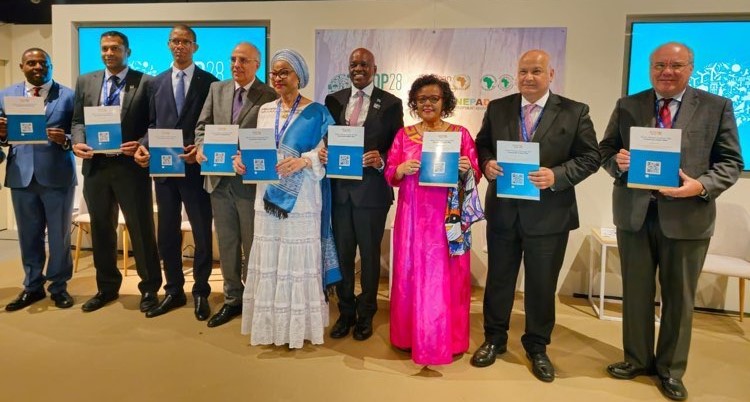
Nchedi Sophia Maphokga-Moripe, GWP’s Steering Committee member from South Africa, said, “we saw the interest from other countries to replicate what AIP is doing.… We are aware that going forward there is a need for countries to come up with strategies like the AIP to ensure they can bring up investments for their countries, particularly for water.”
3. Collaborative processes strengthen water resilience
On 3 December, GWP co-organised an event covering the effective governance strategies for water resilience in the face of climate change, hosted in the COP28 Resilience Hub. The event highlighted the importance of reaching across traditional barriers and working together. In Tanzania, a cross-sectoral working group has been convening for over a year to co-develop response strategies that address key barriers to climate-resilient water management as part of the Global Water Leadership Programme (GWL). GWL-Tanzania Coordinator, Asha Msoka, shared insights on how this long-term collaborative process is strengthening Tanzania’s approach to water resilience: “Tanzania is endowed with water resources but they are not evenly distributed … The government started to implement Integrated Water Resource Management early on before the country would be in a critical water stressed state.”
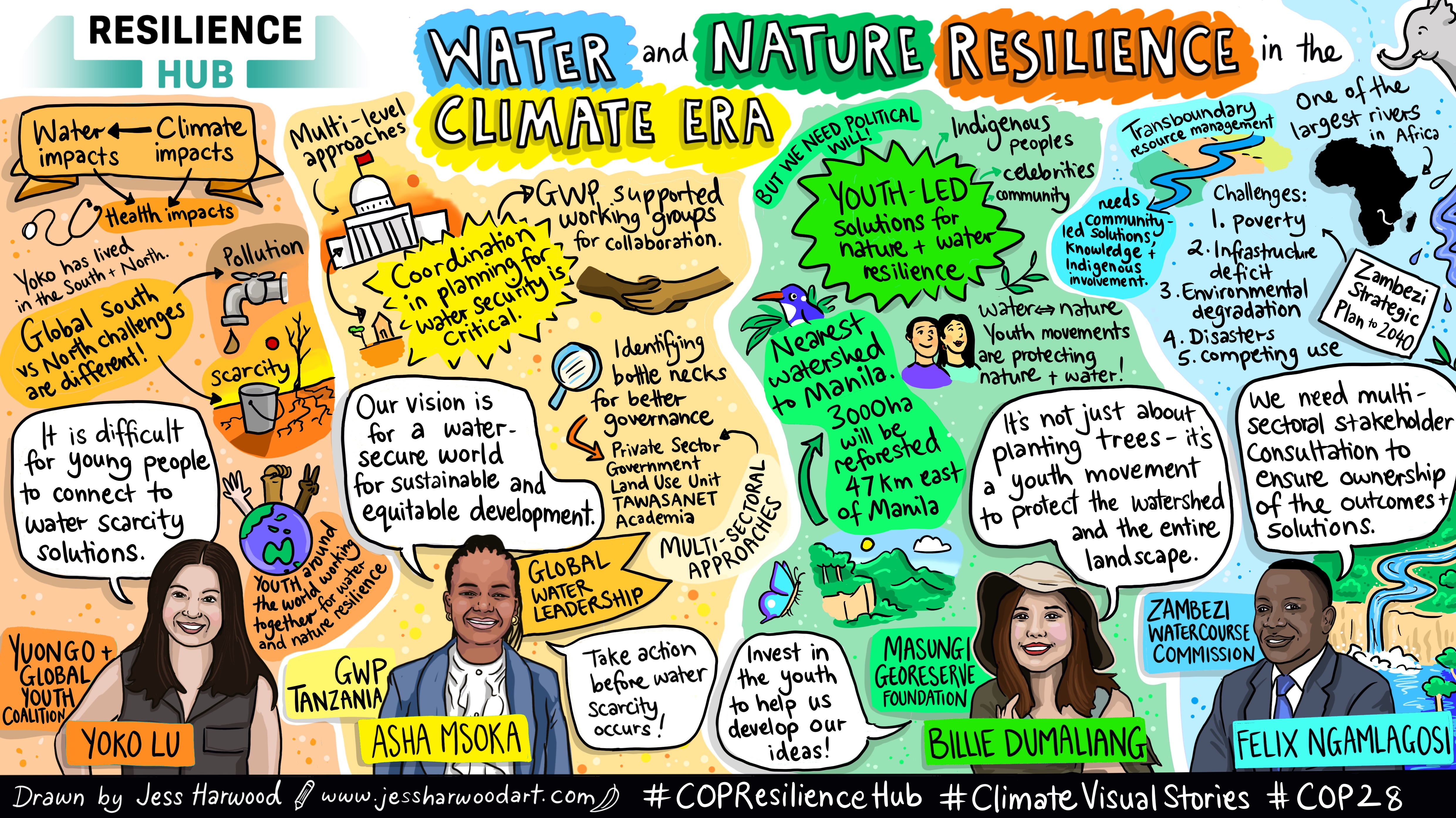
4. Ensuring countries have the support they need to access climate finance through the Transformative Climate Finance Day
GWP co-curated the Transformative Climate Finance Day at COP28 on 11 December, in the Water for Climate Pavilion together with the Green Climate Fund and French Water Partnership. Discussions centred around why investing in water resilience is crucial; investment opportunities and needs; exploring the different sources of climate finance; and conceiving required technical and capacity enhancement support. The day opened with a talk from Meike van Ginneken, Dutch Special Envoy for International Water Affairs, who stated, “let’s make water the engine of climate adaptation”.
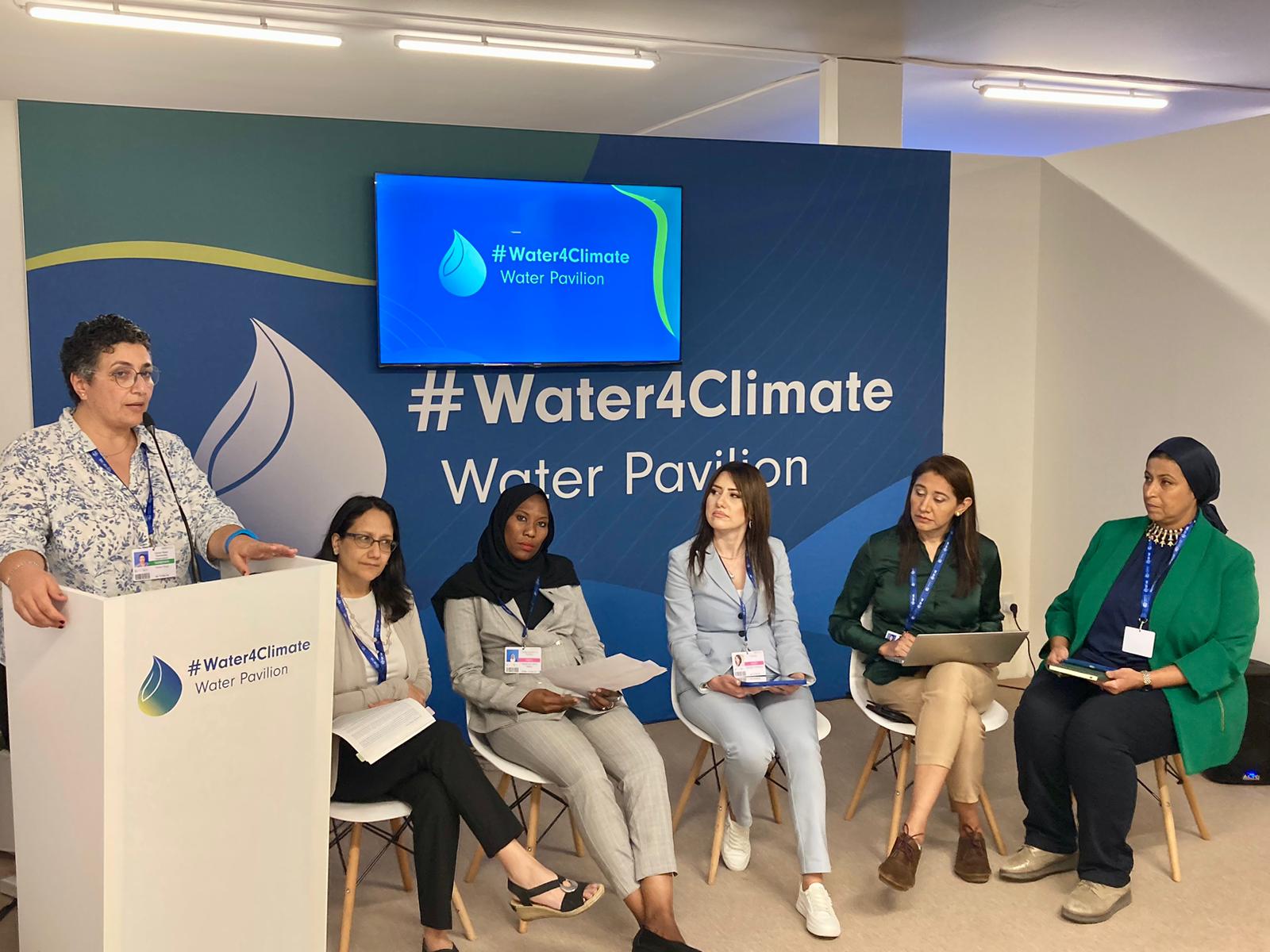
This day also brought a special celebration for the winners of the Water Changemaker Awards 2023, who had been announced on 2 December by the H.E. Dr. Mokgweetsi Masisi, President of Botswana. The awards are a global initiative, co-convened by GWP, K-Water, AIP and the World Bank, that recognises high-level commitment and leadership for climate-resilient water investments. The celebration event was a highlight of COP28 for Alex Simalabwi, who reflected on the Youth Awards section, “young people from different parts of the world who have won the competition presented their work and showcased some of the innovation that they are really focusing on that can help to address the climate challenge through better water management as a solution.”
Finally, the day built up to an International High-Level Ministerial Panel on accelerating investments. Here, ministers shared case studies from their countries, linking opportunities, highlighting sources of investment and encouraging partnerships.
Looking ahead
As we move forward from COP28, GWP will be supporting the governments of Zambia and Somalia on new initiatives to strengthen their country’s readiness to leverage climate finance for water and climate investments. GWP will continue to explore potential collaborations discussed at COP28 on similar fronts with governments of Lebanon, Tunisia, Mauritania, Sri Lanka, Honduras, Armenia, Nepal, and Burundi. This engagement with countries post-COP28 builds upon a solid foundation of GWP’s work with countries on accessing climate finance.

